Crapshoot: Cool Yoda Stories, bro
We're rerunning Richard Cobbett's classic Crapshoot column, in which he rolled the dice and took a chance on obscure games—both good and bad.
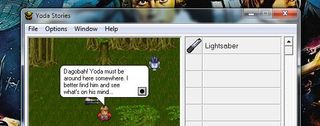
From 2010 to 2014 Richard Cobbett wrote Crapshoot, a column about rolling the dice to bring random obscure games back into the light. This week, who's the most dedicated rogue in Star Wars' interactive legacy? No, not that Solo guy. Though it is a singleplayer game, I suppose.
I can probably sum this one up in a single sentence.
"When nine hundred years old you reach, tell crappy stories you will not, hmm?"
That said, the Doctor's still doing OK.
It's a good time for roguelikes and their descendants at the moment. Whatever you think of the game itself, Diablo 3 managed to sell roughly seventeen billion copies of its randomly generated dungeon-crawl, The Binding of Isaac and FTL knocked the indie world's socks off, and Torchlight 2 joined the party with no small amount of cheering.
Now, of course not all of those are true Roguelikes, none being truly turn-based and not all featuring permadeath in the traditional style. They're all at least on the family tree though, as indeed was this week's slice of little-known obscura.
Yoda Stories is actually a semi-sequel to another game, Indiana Jones And His Desktop Adventures—released 1997 and 1996 respectively—back when the Lucasarts name on a game box was practically an industry stamp of "Great Game Inside" instead of "More Star Wars Pap". Even when it was actually Star Wars. This was pre-Force Commander, and long before the gamut of ghastly guff with 'Episode 1' tattooed across it in shame—the era of classics like Jedi Knight and X-Wing vs Tie Fighter and Star Wars Monopoly loads more. Outlaws. The Curse of Monkey Island. Grim Fandango.
PC Gamer Newsletter
Sign up to get the best content of the week, and great gaming deals, as picked by the editors.
Desktop Adventures, to give the two-game series its proper title, was an odd idea that actually did make some sense, but was always going to struggle next to all of that. Those were polished, refined experiences, with the typical comparison between Lucasarts and its arch-rival Sierra that Lucasarts made movies while Sierra made TV shows—its adventures in particular were more or less Pixar in point-and-click form, especially classics like Monkey Island and Day of the Tentacle.
Desktop Adventures were cheap and cheerful bits of fluff using the company's most famous licenses. A poor, game-starved office worker sick of Minesweeper and Solitaire could fire one up over a lunch-break, play a whole game while eating a sandwich, and then continue their drudgery in the knowledge that they'd made an ugly green Muppet mildly impressed.
Indiana Jones And The Fate Of Atlantis creator Hal Barwood took the lead, with the team putting together a simple randomisation system and sprite based engine that could practically run on a calculator. Given that the most popular calculator based game at the time was entering '5318008' to make it say 'boobies', that rather explains why the idea only had slightly more life in it than Sierra's narrative based screensaver Johnny Castaway.
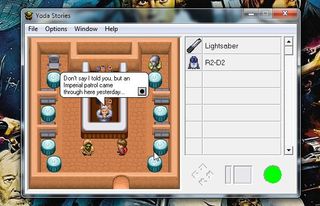
Indiana Jones was easily the more successful of the two, simply because the nature of Indy's adventures lent it to random tricks and traps, similar-looking locations, and basic treasure hunts. Which of course is all the engine could really manage. Transpose it to Star Wars and try to pretend there's a narrative, and the best you're going to get is... well, this.
"Dagobah!" exclaimed Luke Skywalker, climbing out of his X-Wing and sniffing the swampy goodness. "Yoda must be around here somewhere. I better find him and see what's on his mind..."
Luke paused for a moment to rub his suddenly giant head, before beginning his journey through the swamp—lurching painfully a block at a time and occasionally glaring up at the sky as if to say 'I'm watching you...' to some unseen observer. Not far away though, he encountered an old friend.
"Artoo!" he exclaimed, for he was having an exclaimy kind of day. "What are you doing here?"
"Wheeoo...bzzzt. I'm here to HELP!" Artoo replied. "Take me along, then drop me on anything you find confusing, and I'll give you some hints?"
Luke paused, trying to work out which was weirder: his trusty robot's newfound eloquence, or the fact he could now stick Artoo down his pants. He opted for the former. The second was really more of a fantasy, especially knowing how many bits and twirly things the droid had to offer.
Master Yoda was only a short walk away, because Dagobah consisted of about five screens. Today, he was in his house instead of pointlessly standing around the swamp, though that never actually made any difference. Luke tensed as he entered, as he would when Artoo took his much-awaited turn later that day. What would the greatest Jedi Master in the universe have to say?
"There you are, Luke! Heard my call you did, yes! GENERAL MARUTZ, a leader of the Rebellion, has been kidnapped by stormtroopers. Danger there is, mmm? Fly you must to the frigid snow planet Etorasp and RESCUE the general before Vader tortures the Rebel battle plans out of him!"
There was a long pause.
"Cool Yoda Story, bro," sighed Luke, remembering the days when he actually did stuff that mattered. How far away they seemed now. Almost as far as the pleasure planet Zeltros, where he now decided to fly and hope Yoda died of old age before finding out. And no poodoos were given that day.
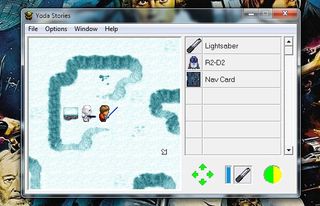
There were three basic problems with Yoda Stories—the first being that the engine simply wasn't up to much, with its blocky movement, hilariously poor combat, and a reliance on short clips of Star Wars music and sound effects more reminiscent of an old Newgrounds movie than an officially licensed product. That wasn't because Lucasarts couldn't make a better one if they chose, simply that everything had to be pared down to a minimum for the series' target audience.
The killer problems though were a lack of assets and a lack of content. Yoda Stories randomises its maps and puzzles, but it only has 15 plots, not even able to swap out things like names to stretch them a little further. Those 15 plots are spread out over just three worlds, which have names like Etorasp and Argavat but are blatantly Tatooine, Hoth, and Endor. The result is that, while all Rogue-style games are going to repeat after a while, its promised billions and billions of possible games gets old after about two hours. Yoda gives you an item. You fly to the planet. You run around fighting the locals for a bit. If you're really lucky you get the story with an Indiana Jones cameo. You return to Yoda, who politely agrees to waste more time. Repeat until Minesweeper is awesome again.
(Speaking of which, here's a fun fact: while it's not in the recent versions, previous versions of Minesweeper had a cheat code. Type 'xyzzy' followed by Shift and Enter and a white pixel would appear at the top left of the screen. Hover over a safe square and it stays white. If it goes black, there's a mine. Should you ever find yourself in 1997, you now have an easy way to impress office workers everywhere, or possibly cheat your way into the dullest e-sport of all time!)
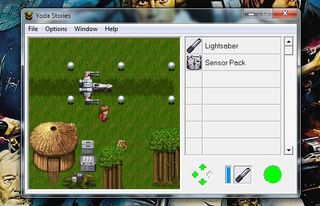
But let's say you do decide to continue your Jedi training, instead of calling Yoda's bluff and wondering if it's OK to make out with a long-lost relative if you pretend you simply didn't know. In most cases you simply land and begin exploring, though there are exceptions—Luke starting off in a medical bay after being shot down and humiliatingly rescued by Ewoks for example, with his ship in a swamp. ("How am I supposed to pull it out of this swamp?" he demands, before sensing a disturbance in the Force, as if a small green muppet shrieked "OH FOR SAKE OF... WHAT WRONG WITH YOUR MEMORY IS?!") Several stories have similar unique moments like this along with the main action.
Mostly though, it's a question of locks. Yoda gives you one essential item at the start of the game, and you pick up others while exploring, sometimes trading them. A Power Converter for a Droid Part for instance. A Keycard to open a door. The worlds themselves are full of enemies to be shot or... hmmm. "Cut up with a lightsaber" is too strong. Waggled at with a lightsaber until they vanish into thin air is probably the best description. Occasionally you go into someone's house, or a traditional location like a cantina, in search of more items. And yes, the cantina is indeed playing that classic Star Wars pop-song "The Only Music Anyone Plays In The Whole Damn Universe". You know the one I mean.
Oh god it's this bloody band, playing the one song they know again
If I hear it one more time, I'm going to kill myself or—
Maybe stuff a thermal detonator up the trombonist's arsehole
Please, oh, please stop, I am begging you!
Not this song!
Not this song!
Not this song agaaain!
Stop it now!
Stop it now!
It's melting my braaaain!
Change the tune!
Change the tune!
Must I cry in vaaaain?
I regret my species evolving ears
**** this ****ing moon.
There then follows a long section of what is, for good reason, known as 'scat'.
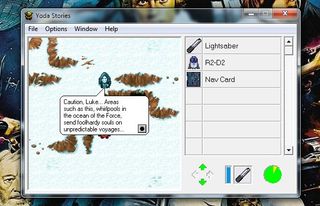
As much as it struggled, being a game that had to be bought on the shelves (though cheaply), the basic Desktop Adventures concept actually has a fair amount of promise—especially factoring in new things like F2P and Facebook and whatever, instead of having to sit alongside 'real' games in software stores. Yoda Stories' main problem, apart from starring the chubbiest Yoda I've ever seen, was really one of resources—how much could be packed into what even then was a tiny amount of space. Yoda Stories is 9MB uncompressed. FTL gets 323MB. It's no surprise it's pretty limited.
(Not as limited as the GameBoy version though, which only provided 15 canned missions in a similarly simplistic engine, and subsequently reviewed as well as plague-flavoured lollipops.)
The same basic concept with modern resources could still be a pretty cool time-killer, with easy patching and DLC and social stuff to help extend the fun. Smuggler Stories, perhaps. Or Bounty Hunters: Top Hits. Anything but what we'd probably end up with: Jar-Jar's Jaunts. Even then, I guess it could work if the regular death animations were brutal enough. Hmm. Someone call Ed McMillen. I think I just created the perfect concept for The Binding of Isaac 2...
Most Popular




